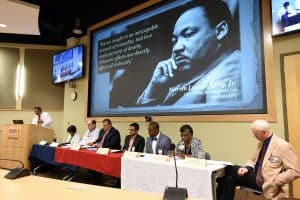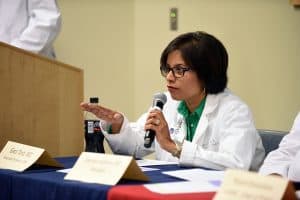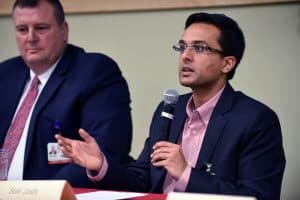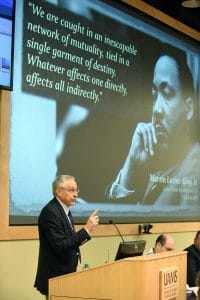Diversity Forum Gives Platform to Sensitive Issues
| Sept. 29, 2016 | Passionate views about gun violence topped the discussion recently as UAMS faculty, staff and students engaged in emotional dialogue on a variety of topics related to diversity and inclusion.
The Sept. 20 lunchtime, panel discussion, “Let’s Talk: Better Together – A Healing Conversation,” gave nearly 100 attendants the chance to discuss issues ranging from recent police shootings and gun violence to race relations, biases and discrimination.
It is one of many events sponsored in September by the UAMS Center for Diversity Affairs as part of Diversity Month. Moderating the panel was Billy Thomas, M.D., M.P.H., vice chancellor for diversity and inclusion and director of the Center for Diversity Affairs.

Billy Thomas (left), M.D., M.P.H., poses a question to the panel of UAMS faculty, staff and students.
“This is only the beginning,” said Thomas. “It’s meant for us to be informal and have a discussion.”
The panel included Sara Tariq, M.D., assistant dean for undergraduate clinical education in the UAMS College of Medicine; Austin Porter, Dr.P.H., M.P.H., an instructor in the UAMS College of Public Health; Salil Joshi, a student in the College of Public Health and secretary of the Associated Student Government; George Hull, director of pastoral care and clinical pastoral education; Carmelita Smith, M.Ed., manager for diversity in the Office of Human Resources; Samuel Jackson, M.D., resident physician; and Robert Barrentine, chief of the UAMS Police Department.
The panel discussed gun violence, including responding to the question, “With an American under the age of 25 dying by gunfire every 70 minutes, what public policy solutions do you believe may address this urgent problem?”
Porter said it was important to look at homicide rates by race, differing intents including homicide and suicide, and accessibility.

Sara Tariq, M.D., assistant dean for undergraduate clinical education in the College of Medicine, said it was important to identify implicit bias.
“In my personal opinion, firearms are too easy to obtain,” said Porter. “We also have individuals who have firearms who should not. There need to be responsible policies drawn up and enforced to address this problem.”
In moving toward a solution, Hull said it was crucial to avoid following a narrative driven by fear.
“Fear is stoked on a continual basis on a 24-hour media cycle by some of our own political representatives,” said Hull. “Statistically, over the past 20 years, deaths by violent crime have fallen in the U.S. while gun ownership has risen.”
Barrentine, who said he was the parent of a victim of gun violence, agreed stricter gun laws are needed, but said more instruction is needed on proper gun safety and the dangers of firearms.
“It’s a rude awakening,” Barrentine said of gun violence. “I know how it affects the victim’s family and society, as a whole.”

Salil Joshi, a student in the College of Public Health, said individual changes help make positive impacts on a community, as a whole.
Discussing criticism surrounding recent police shootings, Barrentine said UAMS police officers would always receive culture and racial bias training to ensure the best service of employees, students, patients and families.
“There are a lot of issues with police departments in this country,” said Barrentine. “It’s not going to be corrected overnight. The incident in Tulsa, when I see that, it sickens me. Not only because I’m white, but because that’s my profession. We’re held to a higher standard and we should be, because we protect you.”
Jackson said human beings are, by nature, socially evolved to have an implicit bias, however, it should not be ignored.
“It’s important to understand we have it and to confront it,” said Jackson. “If we’re ignorant of our own biases, we continue on in the same manner and don’t change.”
Tariq encouraged everyone to take an implicit bias test established by Harvard University, citing her own results that showed bias.
“I was shocked,” said Tariq. “That led me to a different
path of thinking, I had to ask myself what I needed to do differently to do better. It’s influenced how I have conversations and how I interact with people.”
Joshi said making changes individually would have a positive impact on communities.
“Small steps in the right direction that really combat this issue that we see an individual less than us, when we’re all human and follow the same evolutionary path, is something we need to address on a singular level rather than going to the societal level first,” he said.
Smith said altering personal beliefs and biases would ensure UAMS remains welcoming to all.
“It takes each one of us to work toward being inclusive,” she said.
UAMS Chancellor Dan Rahn, M.D., said the panel discussion offered an important dialogue to take part in, citing societal troubles in identifying human bonds and similarities rather than differences.
“If we exclude individuals, we cut ourselves off from being able to benefit from what everyone brings to the table,” said Rahn. “We need to be inclusive for our own sake. It strengthens our organization, country and humanity.”

